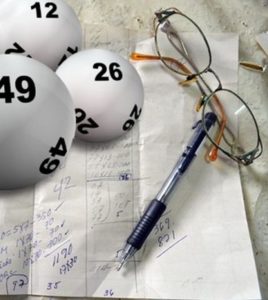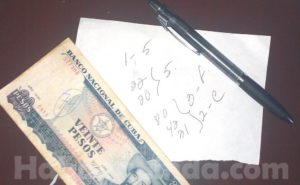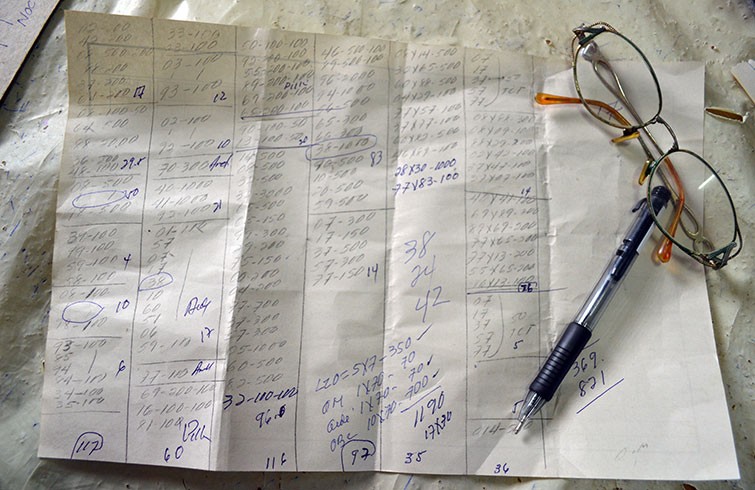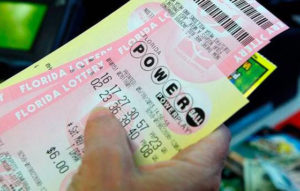“Everyone plays ‘La Bolita’ in Cuba. Or the charade, lottery, whatever you want to call it. It does not matter that it is illegal and give up to four years in the “tank”. Here anyone has put even a peso to a number, “says Ricardo, 57, with the maniacal brightness that leaves the vice.
I used to play more. When there was no food and Kabbalah helped him to be attentive to the details of life. If there were pigeons, the 24. For the day of San Lázaro, the 17 and the 77, that is “crutches”. For the birthday of Fidel Cstro on the 13th, the number he fulfilled and the number 1, because he is «horse».
Ricardo learned the meaning of the digits first, and then learned to read. The tradition came for the family. His paternal grandfather sold tickets before the Revolution, when the results were transmitted by Radio Progreso at two in the afternoon. The same time that his countryman, the Avilanian Martin Fox, became the best banker in the region and became the owner of Tropicana, in Havana.
But in the nineties, he was betting on “hunger”. And the cachumbambé of his instinct led him to ruin several times. “A while I was listero or terminal pointer. I hid the lists in my daughter’s bottle and took them from here to there. But that was more dangerous and I left it. ”
Now he only plays a number, the same one that for 30 years took him out of difficult moments. A weight to 31, “shoe”, every day, religiously, in the City of Portals.
In one of those portals, old Alberto sits down every afternoon to drink rum in a seedy bar. Take paper, pencil and a lot of patience. Everyone knows that he is “listero”, but he looks discreetly around while he speaks.
“There was always a ball for the” left “, even if it was legal, because some” banqueaban “in their homes. After they banned the national lottery, it supplanted those of Táchira and Zulia, in Venezuela. But when Chávez triumphed, the radio stations Radio Rumbo and Ecos del Torbe stopped being heard. Then they began to be guided by the Miami lottery from the 2000s, which enters every day through Radio Martí and a station called La Poderosa, from the United States. ”
Alberto also bets, but is not guided by the destination. It has an empirical system of statistics that seldom fails. His list averages 250 Cuban pesos a day and 20 percent of what he collects is his. When their “points” win, they usually give him a small gift. He takes care to have his list in order before handing it over to the “head of the bank,” the man who piles the “play” of a neighborhood and takes it to the banker.
But a respected banker has at least three “bank heads” that collect at least six lists. That is the case of Pancho, who has been banking for more than 20 years in a downtown area of the city.
“Here you play for the Ca $ h3 and the Play4 of Miami, twice a day. The results are known right away because now there are the satellite dishes and you can see it on Channel 4 at eight o’clock at night. The midday almost always goes online. ”
Prizes vary from one province to another. In Ciego de Ávila, for example, a peso to the fixed number can give a prize of up to 70 pesos, while in Havana it can be 80. Other modalities are the numbers, the hundreds and the famous pair of 700 pesos per
each one that is betting. “But if a banker dares to change those figures, we send a group of friends to remind him how the business works,” Pancho explains, referring to the mafia around the game.
And the police? Cubans at the end, carry in their veins also the desire to tempt luck with numbers. Like that Pancho customer who earned a “padlock”, something very difficult, the three possible combinations of parlés. It was a blow of thousands to the bank and to celebrate
He bought a whole pork, roasted it and choked it with a piece of meat.
“But they do not take people prisoner for that anymore. If they did, it would be better to leave inside those who do not play, because in a jail do not fit so many millions of Cubans. ”
And he is not afraid to break, to be left with nothing? I ask while Pancho waits for five men to “square” the afternoon play.
“The first thing is that I do not bet. The one who is intelligent expresses the business, but does not fall into vice. If someone takes a big prize I do not worry, because it recovers with the days. Also, in this game there is a saying that is a law and so far it has not failed me: «From January to January, the banker always wins ». Always.”
Note: The names of the respondents were changed to protect their identity.
LA BOLITA, LA CHARADA O LOTERIA EN CUBA. UNA ADICCIÓN NACIONAL.
“Todo el mundo juega a la bolita en Cuba. O la charada, lotería, como quieran llamarle. No importa que sea ilegal y den hasta cuatro años en el «tanque». Aquí cualquiera le ha puesto aunque sea un peso a un número”, dice Ricardo, de 57 años, con el brillo maniático que deja el
vicio.
Antes jugaba más. Cuando no había comida y la Cábala le ayudaba a estar atento a los detalles de la vida. Si habían palomas, el 24. Para el día de San Lázaro, el 17 y el 77, que es «muletas». Para el cumpleaños de Fidel Cstro el 13, el número que cumplia y el 1, porque es «caballo».
Ricardo aprendió el significado de los dígitos primero, y después aprendió a leer. La tradición venía por la familia. Su abuelo paterno vendía billetes antes de la Revolución, cuando los resultados se transmitían por Radio Progreso a las dos de la tarde. La misma época en que su coterráneo, el avileño Martín Fox, se convirtió en el mejor banquero de la región y llegó a ser el dueño de Tropicana, en La Habana.
Pero en los años noventa apostaba por “hambre”. Y el cachumbambé de su instinto lo llevó a la ruina en varias ocasiones. “Un tiempo estuve de listero o apuntador de terminales. Escondía las listas en el culero de mi hija y las llevaba de aquí pa´ allá. Pero eso era más peligroso y lo dejé”.
Ahora solo juega un número, el mismo que desde hace 30 años lo sacó de momentos difíciles. Un peso al 31, «zapato», todos los días, religiosamente, en la Ciudad de los Portales.
En uno de esos portales, el viejo Alberto se sienta todas las tardes a tomar ron en un bar de mala muerte. Lleva papel, lápiz y mucha paciencia. Todo el mundo sabe que es “listero”, pero mira discretamente a su alrededor mientras habla.
“Siempre hubo una bolita por la «izquierda», aunque fuera legal, porque algunos «banqueaban» en sus casas. Después que prohibieron la lotería nacional, la suplantó las de Táchira y Zulia, en Venezuela. Pero cuando triunfó Chávez, dejaron de oírse las emisoras Radio Rumbo y Ecos del Torbe. Entonces empezaron a guiarse por la lotería de Miami a partir de los años 2000, que entra todos los días por Radio Martí y una emisora que se llama La Poderosa, de Estados Unidos”.
Alberto también apuesta, pero no se guía por el destino. Tiene un sistema empírico de estadísticas que pocas veces falla. Su lista promedia 250 pesos cubanos diarios y el 20 por ciento de lo que recoja es suyo. Cuando sus “puntos” ganan, acostumbran a hacerle un pequeño regalo. Se cuida de tener su lista en orden antes de entregarla con el dinero al «cabeza de banco», el hombre que amontona la «jugada» de un barrio y se la lleva al banquero.
Pero un banquero que se respete tiene al menos tres «cabezas de banco» que recogen mínimo seis listas. Ese es el caso de Pancho, quien banquea desde hace más de 20 años en una céntrica zona de la ciudad.
“Aquí se juega por el Ca$h3 y el Play4 de Miami, dos veces al día. Los resultados se saben enseguida porque ahora están las antenas parabólicas y lo pueden ver en el Canal 4 a las ocho de la noche. La del mediodía casi siempre sale por Internet”.
Los premios varían de una provincia a otra. En Ciego de Ávila, por ejemplo, un peso al número fijo puede reportar de premio hasta 70 pesos, mientras en La Habana puede ser de 80. Otras modalidades son los números corridos, las centenas y el famoso parlés de 700 pesos por
cada uno que se apueste. “Pero si un banquero osa modificar esas cifras, enviamos un grupo de amigos para que le recuerden cómo funciona el negocio”, explica Pancho aludiendo a la mafia alrededor del juego.
¿Y la policía? Cubanos al fin, llevan en las venas también el deseo de tentar a la suerte con los números. Como aquel cliente de Pancho que se ganó un «candado», algo muy difícil, las tres combinaciones posibles de parlés. Fue un golpe de miles al banco y para celebrar
compró un puerco entero, lo asó y se asfixió con un pedazo de carne.
“Pero ya no cogen preso a la gente por eso. Si lo hicieran, sería mejor dejar adentro a los que no juegan, porque en una cárcel no caben tantos millones de cubanos”.
¿Y no le da miedo quebrar, quedarse sin nada?, pregunto mientras esperan por Pancho cinco hombres para “cuadrar” la jugada de la tarde.
“Lo primero es que yo no apuesto. El que es inteligente exprime el negocio, pero no cae en el vicio. Si alguien saca un premio gordo no me preocupo, porque se recupera con los días. Además, en esto del juego hay un refrán que es una ley y hasta ahora no me ha fallado: «De
enero a enero, siempre gana el banquero». Siempre.”
Note: Los nombres de los entrevistados fueron cambiados para proteger su identidad.
Agencies/OnCuba/Marita Pérez/Internet Photos/ Arnoldo Varona/ TheCubanHistory.coom
THE CUBAN HISTORY, HOLLYWOOD.



 > LA BOLITA, Charada and Lottery in Cuba. A National Addiction. (Photos). <> LA BOLITA, Charada y Loteria en Cuba. Una Adicción Nacional. (Fotos).
> LA BOLITA, Charada and Lottery in Cuba. A National Addiction. (Photos). <> LA BOLITA, Charada y Loteria en Cuba. Una Adicción Nacional. (Fotos).








